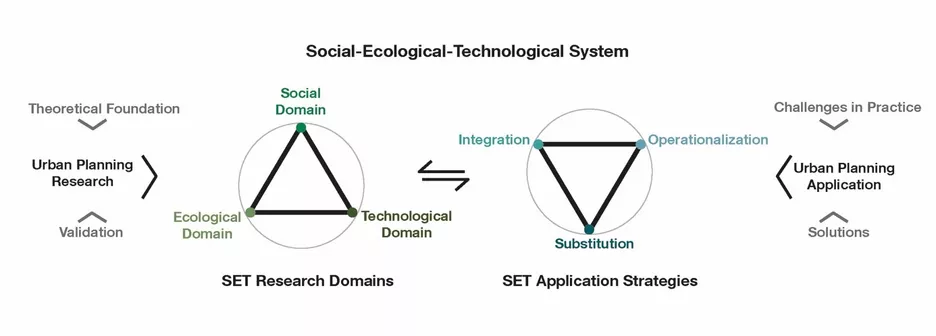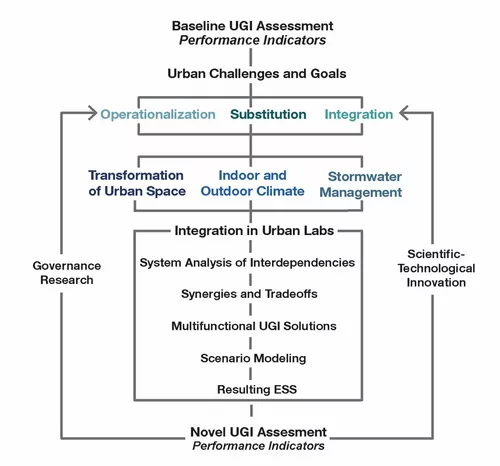Aims
The Research Training Group "UGI" (RTG-UGI) integrates urban planning and design, urban ecosystems, and human health based on the concept of social-ecological-technological systems (SETS) to address current problems in urban environments. The UGI graduate program will conduct transdisciplinary research on parks, green streets, and sustainable drainage systems to understand the underlying mechanisms of ecosystem functions and services.

Based on the SETS framework, the operationalization, substitution, and integration strategies are motivated by linkages between research clusters and subprojects that will provide successful solutions for adapting cities to global change by improving their sustainability and resilience. The strategies are either process-oriented, i.e., they focus on social cooperation and exchange between different social actors (operationalization), or outcome-oriented, i.e., achieving specific goals through UGI design and implementation (substitution and integration).
Research Objectives
Despite many international advances in urban research, there is a lack of interdisciplinary research that focuses specifically on the fundamentals of urban environment and green infrastructure (UGI). As urbanization increases, the complex problems of today's and tomorrow's cities must be addressed by specially trained scientists*. Weather in cities is becoming increasingly unpredictable, with extreme heat, drought, and precipitation events affecting people, plants, and animals. Urban populations demand affordable housing and transportation, as well as abundant urban green space for recreation.
Preserving human health, for example in the face of pandemics, is an important goal, while at the same time improving human mobility in increasingly complex cities. Cities face an uncertain future, and there is a clear need for sustainable and resilient solutions that support the health of through synergistic green infrastructure. The UGI graduate program bridges social, environmental, and technological domains of urban systems to address these needs through innovative research that is both process and outcome oriented. The specific goals are:
- Comprehensive scientific training in urban SET's and practical hands-on experience with UGI through participation in internships with city governments;
- Engage doctoral candidates in interdisciplinary research in UGI through interacting research clusters that span social, environmental, and technological domains;
- Conducting research to respond to current societal needs.
- Promote scientific careers by offering high quality training for (inter)national doctoral candidates, researchers and users.
These goals will lead to outstanding collaborative research that will provide an interface between environmental, technological and social change in urban environments. While such topics are often treated in isolation, the graduate program will produce motivated scholars capable of working on SET's intersections.
